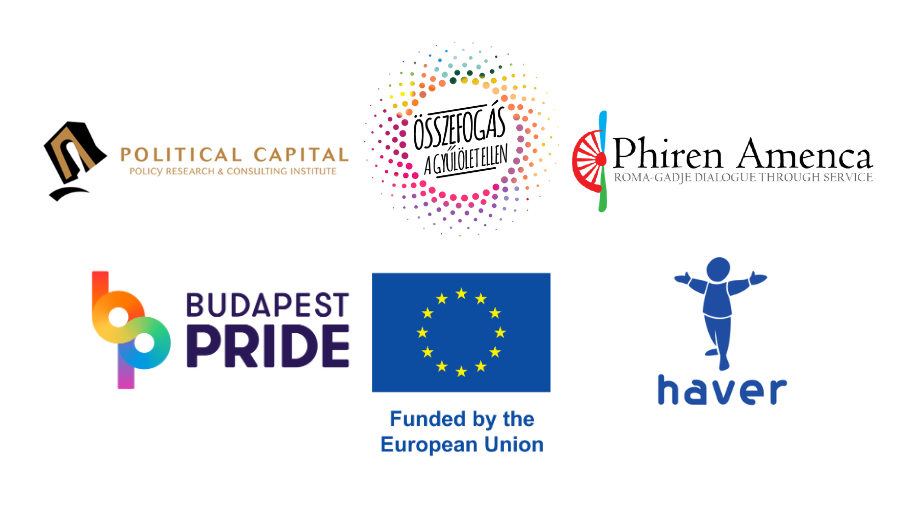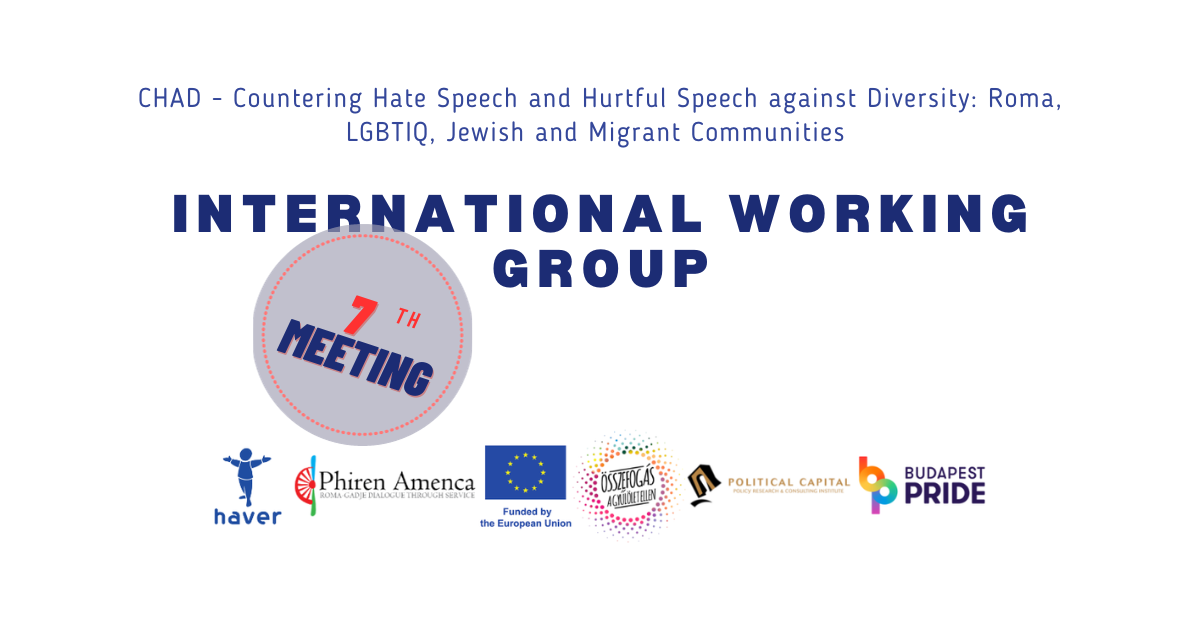October 17, 2023 – Online
The international working group, formed in the frame of the CHAD project, had its seventh meeting on October 17th. The topic was the presence of hate speech against vulnerable groups in recent election campaigns in the CEE region. The meeting focused on how and against which social groups hate speech were present, and also on how different CSOs can counteract this hostile environment to create prejudice- and stereotype-free minority representations and form public discourse accordingly.
Introduction of the presenters
- Márk Finta journalist, Denník N, Slovakia
- Ada Tymińska co-worker, Helsinki Foundation of Human Rights in Poland
- Dávid Vig director, Amnesty International Hungary
Summary of the Presentations
Hate Speech and Disinformation in the Slovakian Election Campaign: A brief introduction to the Slovakian rabbit hole
Márk Finta’s presentation centred on the 2023 Slovakian election campaign and the alarming prevalence of hate speech and disinformation surrounding it. The talk opened by acknowledging the sombre historical backdrop, with the 2018 murders of journalists casting a shadow over the media landscape. High levels of hate speech during the latest election campaign were alarming, targeting multiple minority groups, including the LGBTQ community, refugees, liberals, and Roma.
The anti-LGBTQ sentiment was particularly severe, marked by a rising level of polarisation within Slovakian society. The polarisation manifested itself in the homicide of two LGBTQ people in Bratislava. Despite efforts by President Zuzana Čaputová to counteract this rising hatred, populist politicians exploited the situation, using anti-LGBTQ rhetoric as a political tool. Key figures such as Robert Fico, Tomáš Taraba or Rudolf Huliak openly expressed homophobic views. Even the opposition was not exempt, with the president of the Christian Democratic Party (KDH) Milan Majerský characterising LGBTQ ideology as a “plague”.
The severity of the issue is a result of the global rise of anti-LGBTQ rhetoric and the conservative nature of the Slovakian government and people. Also, there are no parties that would counter the LGBTQ-hostile environment, as even for the opposition, it would mean a significant risk of losing electorates from specific social groups, such as rural areas or older people.
Anti-refugee sentiment has long been in the public discourse, starting with the far-right and slowly penetrating mainstream politics. Recent migration pressures on the southern borders provided fertile ground for Fico’s campaign, where he heavily criticised the government’s handling of the situation.
Populist parties throughout the election campaign demonised NGOs working to protect LGBTQ rights. Anti-EU and anti-NATO narratives further fueled the “anti-everything” rhetoric, which depicted liberals as sinister figures promoting aggressive LGBTQ propaganda.
Anti-Roma and anti-Hungarian rhetoric seemed to have declined, partly thanks to the close relationship between Robert Fico and the Hungarian Prime Minister Viktor Orbán. Furthermore, no far-right party secured a seat in parliament, although mainstream parties like Direction – Social Democracy (SMER) and Slovak National Party (SNS) took up part of their extremist narratives.
The presentation concluded with a warning about the challenging fight against hate speech. Media and scientific institutions have faced growing distrust.
Hate Speech During the Polish Election Campaign
Ada Tymińska, from the Helsinki Foundation of Human Rights in Poland, provided insights into the issue of hate speech during the 2023 Polish election campaign. According to the organisation, hate speech was present in political campaigns irrespective of the parties’ stance on the political spectrum. They discovered that anti-refugee hate speech was the most prominent narrative. Surprisingly, anti-trans messages were not present this time, even though in previous years, this topic formed the backbone of the narrative of the right-wing populist party, Law and Justice (PiS).
Addressing pressing issues like hate speech took a back seat because of the polarised political environment between PiS and the democratic opposition. The emphasis during the campaign was on political competition instead of well-rounded policy recommendations. PiS lost this time with an unprecedented 74% turnout rate.
Anti-refugee rhetoric has been a concern in Poland for a while, as PiS has successfully used this narrative in previous campaigns. This year, the party pushed conflicting narratives during the campaign, including propagating stereotypes about refugees, highlighting a humanitarian corridor for Ukrainian refugees as evidence of Poland’s humanitarian side, and mainstreaming anti-Ukrainian rhetoric borrowed from the far right.
On the same day as the parliamentary election, PiS held a referendum with two questions related to migration. Even though this meant to give salience to the topic even more, the anti-refugee narrative was ineffective and failed to generate enough support for PiS to form a government. Furthermore, only 30% of the electorate participated in the referendum, invalidating the results.
The liberal democratic opposition also took a questionable narrative on refugees. The opposition examined the number of visas issued to Asian and African refugees and found that Poland issued around 250,000 visas. The investigation results were used to accuse the PiS of hypocrisy and importing terrorists. This narrative raised concerns about the opposition’s stance on the refugee crisis and its general openness towards refugees.
During the transition period, President Andrzej Duda is expected to oppose and limit the new liberal government, implying turbulent years ahead. The diverse new coalition may face challenges in implementing pro-LGBTQ and pro-migration policies, particularly without presidential support.
The presentation finished on a positive note and expressed hope that the new governing coalition may create more space for tackling hate speech.
Invalid Answers to Invalid Questions
Dávid Vig, director of Amnesty International Hungary, discussed the backdrop and implications of the anti-LGBTQ referendum in Hungary in 2022. Amnesty International Hungary, Háttér Society and 14 other NGOs were campaigning for an invalid referendum. The referendum, which sought to limit LGBTQ rights, was held in conjunction with general elections, making it a prominent political occasion.
Dávid Vig highlighted the worrying developments that preceded this referendum, including banning gender studies in 2018, a series of homophobic comments from Fidesz politicians, and legislative steps to limit the rights of same-sex couples. These included restrictions on single-parent adoption and a 2021 ban on showing LGBTQ individuals to minors in many contexts.
For the Fidesz government, the primary goal of the 2022 referendum was to mobilise supporters for the general elections. Secondary to its importance, a vital aim was to respond to the European Commission’s infringement procedure against the 2021 law that restricted LGBTQ visibility in the media. Although the referendum was declared invalid due to the successful campaign that produced many invalid votes, its role as a mobilising tool was still thriving.
Civil society organisations advocated for an invalid result in response to the referendum’s manipulative questions. They urged voters to cast invalid ballots as a form of protest. Sixteen NGOs collaborated on this effort, using slogans like “Invalid answers to invalid questions”. Notably, the opposition remained silent during the referendum campaign and did not help the campaign to a considerable extent.
The campaign employed a message of hope and values to gain broad support. It featured cisgender and heterosexual individuals openly discussing their relationships and care with LGBTQ family members and personal experiences with members of the LGBTQ community. Personal stories shared on social media platforms throughout the campaign, played a significant role. Nevertheless, a road trip where local discussions and forums, and where thousands of flyers were distributed in cities nationwide also considerably impacted the referendum’s outcome.
The referendum results speak for themselves: only 47% voted validly, while 1.7 million people casted invalid votes, meaning the required quorum of 50% was not met, which is necessary for a valid referendum. The campaign was a success, especially considering the government’s financial resources compared to the NGO’s campaign budget.
However, the National Election Commission imposed fines on all 16 campaigning NGOs, totalling $26,000. They argued that the campaign undermined the purpose of the referendum, which was to answer “yes” or “no”. On the fined NGOs requested review, the Curia of Hungary overturned three decisions and rejected to deal with two cases on the merit (citing lack of argument). Háttér and Amnesty’s constitutional complaint was rejected, the groups are currently awaiting the decision of the European Court of Human Rights on this matter.
Vig also shared lessons learned from the campaign. Reframing the issue on divisive topics regarding manipulative questions is often more effective than directly challenging the factual background of the questions. Since factual arguments may not be as persuasive as emotional appeals, it is essential to understand societal values and customise messaging to the target audience. Thus, personal stories, in particular, proved to be highly effective. Communication and knowledge sharing between NGOs across countries could be vital for battling hate speech.

The „CHAD – Countering Hate Speech and Hurtful Speech against Diversity: Roma, LGBTIQ, Jewish and Migrant Communities” project (project nr. 101049309) is funded by the Citizens, Equality, Rights and Values Programme (CERV) of the DG Justice, European Commission and coordinated by RGDTS Nonprofit Llc. in partnership with Haver Informal Educational Foundation, Rainbow Mission Foundation and Political Capital. Views and opinions expressed are however those of the author(s) only and do not necessarily reflect those of the European Union or the European Commission. Neither the European Union nor the granting authority can be held responsible for them.


